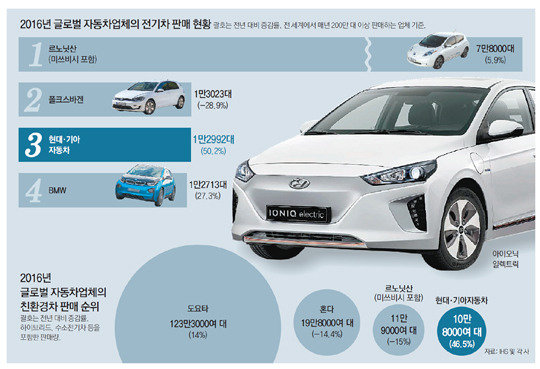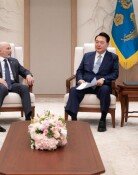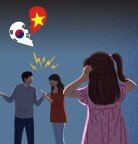Hyundai-Kia Automotive Group becomes No. 3 maker of electric cars
Hyundai-Kia Automotive Group becomes No. 3 maker of electric cars
Posted July. 07, 2017 07:10,
Updated July. 07, 2017 07:36

Environmentally friendly vehicles are rapidly becoming the center of the global automotive market. Sweden’s Volvo announced Wednesday that it would use electric motors on all of its cars from 2019 for the first time among major global carmakers.
According to sources including market research firm IHS on Thursday, the Hyundai-Kia Automotive Group sold 12,992 pure electric vehicles, including the Kia Soul EV and the Hyundai Ioniq Electric in the global market last year, up 50 percent from a year earlier. In 2016, the global market for electric vehicles saw sales of 431,000 cars, up 41 percent from 2015. The Hyundai-Kia group outperformed the world average. The two carmakers held a combined share of 3 percent in the global electric car marker in 2016, up by 1 percentage point from the previous year.
The Renault-Nissan alliance, including Mitsubishi Motors, led the market with sales of some 78,000 electric vehicles in 2016, followed by Tesla, which sold about 70,000 units. Trailing them are China’s government-supported or state-owned carmakers such as Zotye Auto and BAIC Motor Corporation.
Among the top-12 carmakers with global sales of over 2 million units, the Hyundai-Kia group is the third-largest after Renault-Nissan and Volkswagen. The Korean automotive group has surpassed BMW, which sold 12,713 electrics cars including the i3 last year.
Japan’s Toyota Motor Corp. is the undisputed No. 1 maker of eco-friendly cars including hybrid vehicles, as it sold more than 1.2 million units worldwide in 2016. The Hyundai-Kia group ranked fourth after Honda and Renault-Nissan.
The Hyundai-Kia Automotive Group plunged into the eco-friendly car market after successfully developing the world’s first hydrogen fuel cell vehicles in February 2013. As the global eco-friendly car market was led by hybrid vehicles, it once had a sense of crisis over the possibility of losing out in the completion for future cars. Its release of the Ioniq Electric and other environmentally friendly cars has helped address most of the concerns.
“Although other electric cars such as the Tesla and the Volt focus on the driving distances, efficiency is more important to electric cars,” said Yang Woong-chul, vice chairman of Hyundai Motor, expressing confidence over Hyundai’s technological advantage over its competitors.
The Hyundai Ioniq Electric received 136 MPGe, or miles per gallon gasoline equivalent, the top rating on fuel economy, from the U.S. Environmental Protection Agency, beating the all-electric BMW i3 with its 124 MPGe rating. The Ioniq Electric can run 191 kilometers on one charge, about half of the Tesla Model S 90D, which can run 378 kilometers. Based on the assumption of running 15,000 kilometers a year, it costs about 580 dollars to drive the Model S 90D, while the Ioniq Electric costs around 220 dollars.
In order for the Hyundai-Kia group to maintain continued growth in the eco-friendly car sector, it is essential to develop technologies and build infrastructures, which means it needs to put the priority on building recharging stations to expand sales of hydrogen fuel cell cars. "The Hyundai-Kia group needs to build its own technologies rather than depending on imported components in order to achieve its goal of becoming the No. 2 carmakers in the eco-friendly vehicle market," an industry expert said.
Se-Jin Jung mint4a@donga.com







